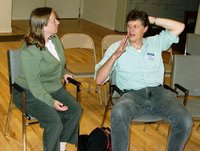I'll never forget the intense conversation another Friend and I had with him as we walked around the neighborhood near the conference center one evening. We were talking about some aspect of Quakerism.
"I have friends who are not at all religious, but I know they are saved!" he said fervently at one point.
I almost wanted to back away from him. What was a person who'd grown up Quaker doing talking about whether people were "saved"? And feeling so intensely convinced of the Truth he was conveying -- they were saved -- and that it mattered so much to him? His energy and intensity and conviction burned into me. We never did have much contact, but I do remember that encounter.
- - - - -
Over at Growing Together in the Light, Will T. writes in this post, "I do not mean to imply that we should have a creed or statement of belief but that we need to find a core understanding of Quakerism that we at least agree to wrestle with to be able to continue as a religious community."
I agree! And just how are we to define that core understanding, when many of us have such different vocabularies? Most of the time I think we're describing much the same thing, from different vantage points. But are we? It seems like all of us wonder, at times.
- - - - -
I recently re-read Samuel Caldwell's 11/1998 evening talk at Pendle Hill, "The Time Has Come to Choose." The choice he posits is between Quaker faith, as against Quaker culture (full text available here). I liked what he had to say so much that I hand-wrote it into my journal, and now I'm retyping it rather than copy it:
God gives to every human being to every human being who comes into the world – regardless of race, religion, gender, or station – a measure of the eternal Light to be inwardly guided by on a daily basis. That Inner Light is supernatural, personal, universal, saving, eternal, persistent, and pure. The chief end of religious life is to learn to listen to and act upon the promptings of this Light under the authority of God and within the bonds of human community. Those who learn to heed the promptings of this Light come to be “saved” – that is, they come into fullness and wholeness of life and right relationship with God, themselves, the universe, and one another. Those who resist, ignore, or otherwise deny the workings of this pure spirit within them, though they profess themselves to be religious, are “condemned” – that is, they become alienated from God, from themselves, from the universe, and from one another.
That’s it. That’s the whole enchilada.
- - - -
It was Caldwell's definition of "saved" and "condemned" that had me remembering Michael from New York. These are terms I resonate with. And the agency of free will in choosing one over the other is clear. God has given us that ability, and waits in expectant worship for us to find the Way.
Similarly, Will T.'s "This is Eternal Life" speaks to me in a way I might not have been able to hear well a dozen years ago. I found it breathtaking.
What do you think? What is your core understanding? Where do you find the Life, the Truth, and the Way?

